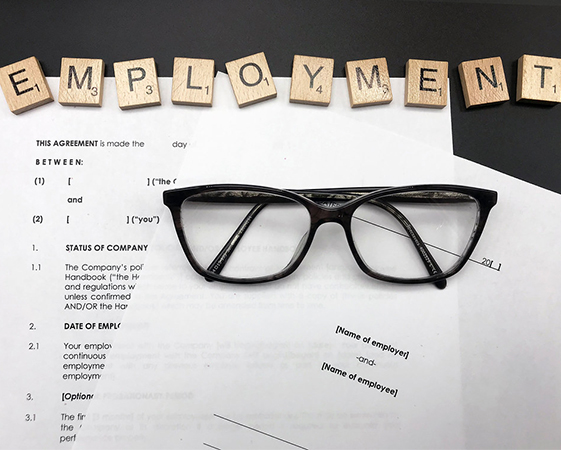By Eimhéar O’Kane, Corporate Associate
As a response to the global pandemic, the UAE published Ministerial Resolution No.279/2020 “Regarding the Stability of Employment in Private Sector Companies During the Period of Applying Precautionary Measures to Contain the Spread of the Novel Corona Virus” (the “Resolution”). The Resolution aims to strike a balance between providing private-sector companies with means of sustaining their business through these difficult times, whilst attempting to ensure that private sector jobs are protected and maintained. The Resolution therefore provides gradual steps which can be applied by employers as a response to the precautionary measures imposed on their company. It is important to note that the Resolution is only applicable to non-citizen employees.
Following the implementation of the Resolution, we have summarised our most frequently asked questions below.
Can my employer make me to take all of my paid annual leave?
The Resolution did not introduce this right but simply reiterated the right under Federal Law No.8/1980 (the “Labour Law”) that permits employers to set the date on which an employee must take their paid annual leave; this allows companies to fix employee’s leave at a time most suited to their business needs.
Can my employer place me on unpaid leave?
The Resolution introduced the option for employers who are affected by the precautionary measures period, to request that the employee takes a period of unpaid leave. It is important to note that this option requires the employee’s explicit consent which should be obtained in the form of a temporary additional addendum to their Ministry of Human Resources & Emiratisation (“MoHRE”) employment contract.
The length of the period of unpaid leave should be agreed between the employee and the employer, this period is then noted in the addendum to the MoHRE employment contract. If, upon the expiry of the agreed period, the employer feels they need to extend the period further, this extension can be agreed with the employee and a new addendum should be signed. The employer must retain a copy of the contract addendum and MoHRE can request a copy of this from the employer at any time.
If, during a period of agreed unpaid leave, the Resolution is officially terminated as a consequence of the precautionary measures period finishing, then the period of unpaid leave shall also expire, regardless of the agreement between the parties.
During a period of unpaid leave, all employment rights (with the exception of salary) remain valid. For the avoidance of doubt, unpaid leave does not equal the right to terminate an employee’s visa or medical insurance.
Can my employer reduce my salary?
After considering the option of working from home along with the above mentioned temporary measures, the Resolution provides the right for employers to temporarily, or permanently, reduce the salary paid to employees. Both temporary and permanent reductions can only be imposed following the explicit consent of the employee.
For a temporary reduction in salary, the employee is required to sign a temporary addendum to their MoHRE employment contract which will state the amount of the salary reduction and the period for which it will be applicable. The applicable period will end at the earlier of the expiry of the agreed period, or upon the expiry of the Resolution as a result of the precautionary measures being lifted.
If the employer wishes to make a permanent reduction in salary, they must obtain the employee’s consent and must make an application to the MoHRE to obtain their consent also before they can proceed with the reduction.
The Resolution does not specify any minimum or maximum limit to the reduction in salary but given that the amount should be agreed with the employee, we recommend that the reduction should be a reasonable amount.
Can my employer terminate my employment if I do not consent to a reduction in salary?
Under the Labour Law, an employer can only terminate an unlimited-term employment for a valid, work related reason or, as a result of a gross misconduct incident. Terminating employment for any other reason will be considered arbitrary dismissal and may be compensated by up to three (3) months’ gross salary following an order of the court. Termination for any reason, other than a gross misconduct reason, during the term of a limited-term contract will be deemed arbitrary dismissal and will result in similar financial consequences.
It is therefore possible that, if your employment is terminated as a result of a rejection of a salary reduction, you may have grounds to submit a claim for arbitrary dismissal.
If, as a result of financial difficulties, an employer intends to terminate certain employees, they should follow the guidance provided by the Resolution. The Resolution provides that, companies who have excess employees can, in effect, terminate their employment on the condition that that they continue to provide all of the employee’s legal entitlements (except for salary), including visa, medical insurance and housing allowance. During this time, the company must place the employee on the Virtual Labour Market (https://mohre.hyrdd.com/) enabling them to find alternative employment. The company is required to continue with their obligations until the employee finds alternative employment or leaves the UAE.
Employers who choose not to follow the procedures for termination set out in the Resolution run the risk of claims for arbitrary dismissal from employees in the future.
The Labour Law and the Resolution both apply to all mainland companies; this article does not consider the laws in DIFC or ADGM. If you are located in any other free zone in the UAE, you should contact the relevant free zone authority to discuss their application of the Resolution.
If you are a company or an employee who is experiencing anything discussed in this article and would like to discuss your rights and how Horizons & Co can assist you, please contact us at [email protected].

